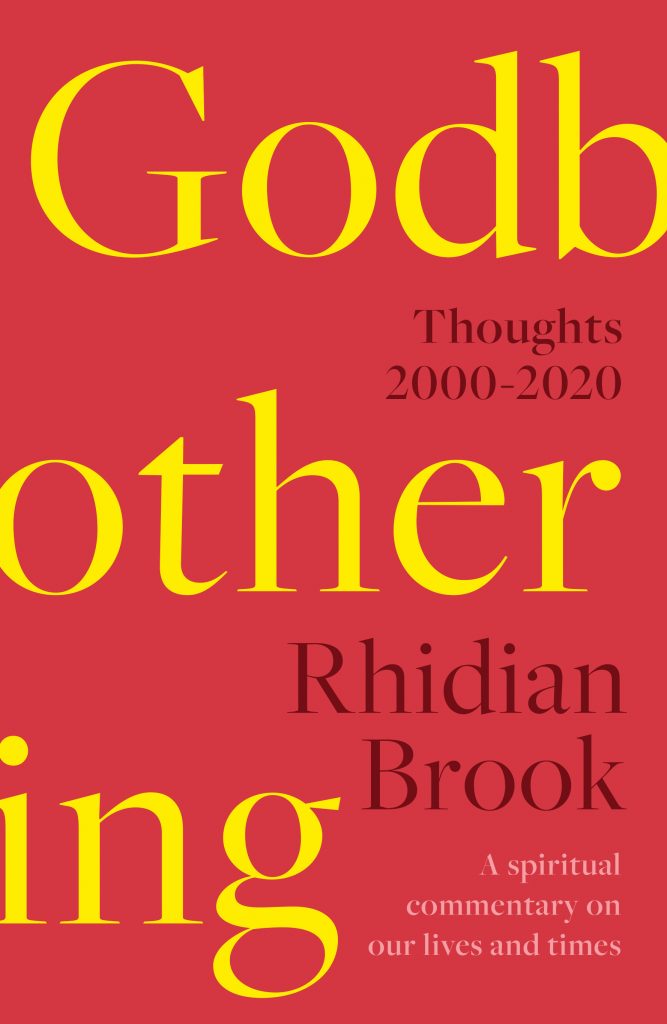Dylan Moore urges us to begin our lockdown reading with ‘Godbothering’, Rhidian Brook’s collection of ‘Thoughts 2000-2020’, which may help us gain perspective on the current crisis.
‘I hate celebrities, Harry Potter, musicals, tables on pavements outside restaurants, carol singers and Thought for the Day. Unless Rhidian Brook is on.’
So said the author Philip Kerr. Personally I’d blame the weather rather than the tables for the poor quality of al fresco dining in the British Isles, I think carol singing promotes much missing communal good cheer and should make a comeback – and at least Harry Potter got kids reading! But on (most) celebrities, (most) musicals and (most) Thought(s) for the Day, I see where Kerr is coming from.
Rhidian Brook is of that cohort of great and good Welsh people (see also comedian Paul Whitehouse, actor Keith Allen and fashion designer Jeff Banks among many others) who has somehow managed to forge a London-based career, internationally noted but very little remarked on within Wales.
Born in Tenby in 1964, Brook was schooled in Hampshire and has lived in London for most of his adult life. Although perhaps this potted biography offers an explanation for his relative sidelining in his homeland, it is certainly not a reason. Brook’s work deserves to be much more widely known – and celebrated – in Wales.
Rhidian Brook first took up writing fiction while suffering from a post-viral condition in his mid twenties. His debut novel The Testimony of Taliesin Jones was published to acclaim in 1996, winning prizes including the following year’s Somerset Maugham Award, after which it was made into a feature film starring Jonathan Pryce.
As its title suggests, the book was a coming-of-age story: a boy on the cusp of adolescence finds faith in God amid the emotional fallout of his parents’ divorce. Drawing on aspects of Brook’s own spiritual awakening much later in life, that book and the writer’s second novel Jesus and the Adman (1999) grapple with deep questions: the existence of God, the meaning of life, how to live by faith in a secular world.
These themes find full expression in his virtuoso latest, The Killing of Butterfly Joe (2018). Joe Bosco is a charismatic butterfly salesman who captivates the narrator, a disillusioned Welshman called Llew Jones (like Taliesin, yet another Rhidian avatar?) who is travelling across the United States in search of inspiration and experience.
Jones is captivated not only by the wild and brazen salesmanship of Joe, but also by the beauty and brains of his two very different sisters. Hay Festival director Peter Florence described the book as ‘the bastard lovechild of Brideshead Revisited and The Dukes of Hazzard’, which gives a good idea of its bold, brilliant energy as well as its touching portrayal of male friendship.
Between these offerings, Brook has worked largely as a scriptwriter on BBC drama – Silent Witness and Atlantis – as well as feature films like the heartwarming Africa United. His 2013 novel The Aftermath was also turned into a film. Drawing on the real life story of his grandfather, Walter Brook, who on being allocated a requisitioned house in post-war Hamburg took the highly unusual step of sharing it with the original German owners, the novel follows the complicated fallout when the Morgan family from Narberth move in with a widowed architect and his teenage daughter.
Starring Keira Knightley as grieving mother Rachael, the film version obliterates the Welsh background of the protagonists (which was already pretty nominal in the novel) as well as much of the grime and grit of a desolate post-war city that makes it a gripping read.
But despite the success of his novels and the uneven reception for their movie adaptations, it is Brook’s regular role on the Today programme – as one of the voices that offer a Thought for the Day – that should, by now, have secured his place in the front rank of the Welsh imagination.
True, there is a quintessential Englishness about BBC Radio 4, perhaps even especially on the station’s flagship news programme that was for 32 years presented by a man from Splott, but given that – in the words of Mona Siddiqui, Professor of Islamic and Inter-religious Studies at the University of Edinburgh – ‘Rhidian’s thoughts are elegantly crafted with imaginative storytelling and real depth… he is one of my favourites’, there should if not outright pride then at least widespread awareness among the Welsh populace that – whatever our feelings about Thought for the Day in general – one of our own is offering a regular dose of wisdom to seven million listeners, a tenth of the UK population, and simultaneously holding up the slot’s reputation.
His latest book is the bravely titled Godbothering (it concerns a God who is bothered rather than those humans who might bother you about God). The volume collects twenty years’ worth of Rhidian Brook’s Thoughts, and as such forms a kind of alternative history of Britain in the twenty first century – a search for divine wisdom in everything from David Beckham’s broken metatarsal to the murder of Damilola Taylor, from Big Brother to the moral panic about hoodies in shopping centres.
With an unplanned neatness of timescale that takes us from the turn of the millennium to the turn of this year, some of the entries seem like items plucked from a time capsule – America’s presidential choice between Kerry and Bush, the break-up of Brangelina – while other stories never seem to go away, rumbling on like the proverbial radio left on in the background: war in Syria; the Hillsborough families’ ongoing fight for justice; dinner party conversations about schools.
The twenty-first century’s opening double-decade has given us virtue signalling, ‘snowflakes’ and WhatsApp. The challenge of Thought for the Day, Brook acknowledges is ‘to put some glory / in the morning’s story… to see the spiritual in all this material’, and his small triumph is in a consistent ability to find something deep and genuinely thought-provoking in all manner of events, from the tragic to the trivial. And although the nature of writing for a daily radio show creates a high degree of risk that the thoughts of today will become the fish-and-chip paper of tomorrow, a retrospective like this allows the benefit of hindsight.
As someone who in 2006 took his wife and two young children on a research trip for the Salvation Army, travelling through some of the places worst affected by the AIDS pandemic in Africa – resulting in the book More Than Eyes Can See – the author notes a turning point in 2012 when Save the Children launched its first appeal for UK children.
Reading over these last two decades’ worth of thoughts, there is no denying the impact of austerity on those of Christianity’s chief concern: society’s poorest. Rhidian Brook’s regular musings on inequality peak in a moving piece juxtaposing two London towers, each iconic in its own way: the Shard and Grenfell.
Most impressive though is that amid two decades worth of bad news and increasing rancour, Brook’s still, small voice has been insistent in championing hope, embodied in a Jesus who is neither left nor right but ‘way more radical than any politician in history’.
In the choice of 2020 as a cut off point for these Thoughts, Brook appears to have performed a miracle. It’s his kind of thinking that we’ll need as we emerge from this current crisis, transformative and open to radical change. If you’re Welsh (or even if you’re not) and you’ve never heard of Brook, then work backwards. Godbothering is a brilliant place to start your lockdown reading.
All articles published on the welsh agenda are subject to IWA’s disclaimer.





